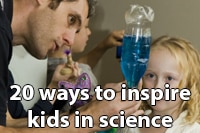
Ignite their curiosity!
So you love science & technology? Want to impart this enthusiasm onto your kids? No problem! Children are born as curious learners and exposing them to science doesn’t have to be an arduous and formal process. As a parent of two young kids myself I’m constantly looking for ways to inspire kids to want to learn more about their world. The reality is that kids want to know about the world anyway, you just need to provide them the opportunity! Given this, here’s just some of the ways you can introduce them to the wonders of science without burying them in a textbook or spending time with a tutor…
1. Ask why? Ask how? Ask questions as many times as possible! This teaches children to question the world around them and find out why things actually work. Even things that are seemingly mundane to you are worth exploring eg. how do plants grow or what makes a car move or how does a plane fly? The more kids look at cause and effect, make predictions and see results of changing the more they learn to think logically & appreciate what is happening around them.

Checking out the planes at Hong Kong airport
2. Run simple science experiments at home with materials from the local shops. You don’t always need fancy materials and a lot of the science experiments we’ve collated here are very inexpensive and still grab kids attention. This is a great way to cover a rainy weekend and the best bit is while the kids are engaged you will have fewer behaviour problems (I promise!).
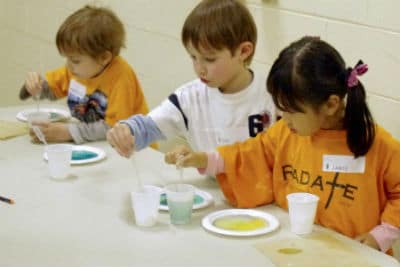
Experimenting with simple materials
3. Read science books with them at an appropriate level. Be less concerned about their age and more concerned about what they can understand. Try to vary the topics as much as possible!
4. Find a variety of natural history & geography documentaries and sit with them to answer questions. You might even learn something too!
5. Install science apps on their tablet. There are so many educational apps available these days, why not include some STEM activities into the mix?
6. Take them on a day trip to a science museum, zoo, aquarium or national park. Spend the time at each exhibit to explain what’s going on with your children and make sure to take in a demonstration or two!
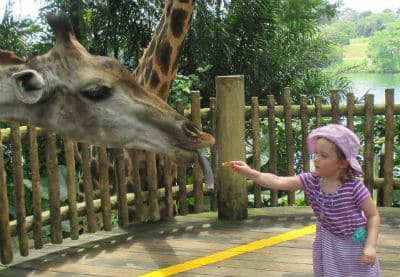
Feeding giraffes at Singapore Zoo
7. Cook with them. Following a recipe teaches procedural thinking plus you can vary the ingredients to see if there are different results (part of the scientific method). Why not make a science cake or maybe some ice-cream?
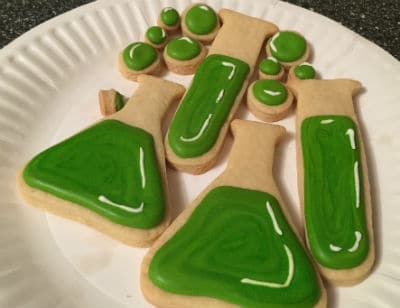
Science beaker cookies
8. Introduce them to scientists and engineers whenever possible. Science week events are a perfect time to bring the kids along to public talks on current research. Also make sure to visit engineers, mechanics, electricians, carpenters and more as they have a huge amount of knowledge in how things work. Let them help around the house by fixing things with real tools too; as long as the activities are well supervised your children will be better for it.
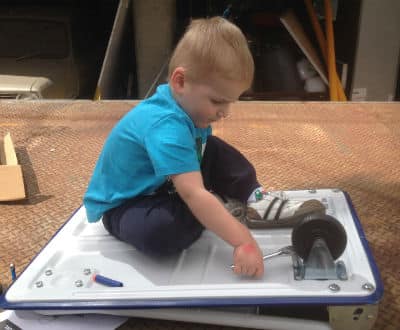
Putting together a hand trolley
9. Bring the kids to a science fair or STEM event at your school.
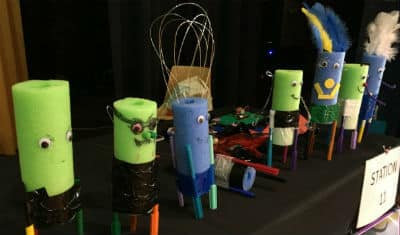
Scribblebots at Peninsula Community of Schools
10. Choose toys that teach STEM wherever possible. It can be easy to be caught up with buying toys that promote the latest kids movie or TV show, however, children tend to learn more with puzzles, construction toys, magnets, nature study, electrical kits, chemistry kits, toys that move and those that work with light and sound.
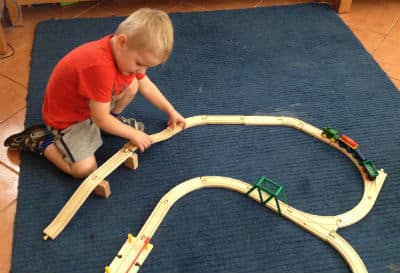
Making a wooden train set
11. Teach them coding from a young age. A good start is code.org or https://scratch.mit.edu/.
12. Be an example of an active learner; read non-fiction books in front of children (even whilst they’re doing something else). Lately, I’ve been a big fan of Big History narratives as well some of the writing from Mary Roach.

Bill Bryson’s A Short History of Everything
13. Enrol them in holiday science workshops to extend their learning as well as have some fun!

Kids in the Park, Sydney Olympic Park
14. Discuss how things work during car trips. Maybe put a science podcast on during those long trips?

Stuff you should know podcast
15. Show examples of awesome female and male scientists. Yes the science itself is amazing but the personal stories from the scientists on overcoming adversity can be very compelling. BTW: why do they have to be famous? Why not just are ordinary people doing extraordinary things?
16. Start an insect or plant collection with your kids.
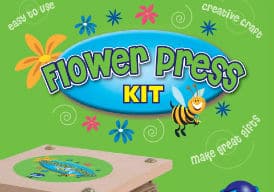
Flower Press Kit
17. Have a science party! Seriously, kids science parties are incredibly engaging and in the process, you’re showing people that it’s ok to enjoy learning about the world.

Giant bubbles in the science party
18. Go for a bush walk and take some field guides and camera with you. This would make a great photo journal with entries about how the children observe the changes in the bush as you move from the valley floor to ridge top.
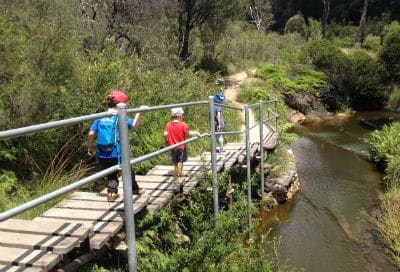
Bushwalk in the Blue Mountains, NSW
19. Encourage your children to spend more time outside. Allow them to get dirty! This is especially powerful if you don’t give them too many toys to work with… why not have a cubbyhouse construction challenge? Sounds like engineering to me! Plus, why not consider getting your child into gardening too?
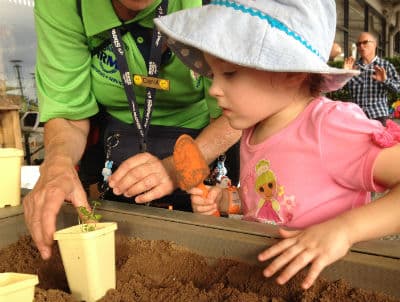
Learning gardening tips at the Sydney Royal Easter Show
20. Building off the cubbyhouse idea, any artistic challenge will allow your kids to explore their own creativity and in doing so unlock even more potential that they have. After all, these days many people are talking about STEAM just as much as STEM.
Of course, it doesn’t matter if your child never enters a career that directly is related to STEM. What does matter is that your child grows up to appreciate the world around them, knows how the discoveries that have been made make their lives better and understands why the research scientists and engineers conduct daily is so important. By imparting scientific literacy to your kids you’ll give them every chance to understand the implications of policy decisions, to discern the truth vs. hyperbole in tabloid news articles and be able to come to rational conclusions on what is happening in their lives.
Teaching kids to take a moment to stop and look carefully at what is going on is important; this they way they won’t miss the little things and they’ll have the tools plus the wisdom to find out more about areas where need more knowledge. In short, they will lead more informed, more enriched lives which when you think about it, isn’t that the point of education?
Happy teaching,
NEW Primary science teaching book!
“Be Amazing! How to teach science, the way primary kids love”


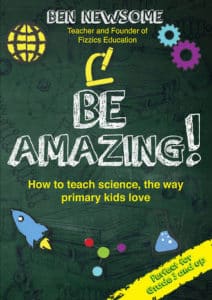

























Hi I am a high school and primary school teacher, currently teaching year 6 at Bribie Island State School. I am seeking a current competition for a project for students connected to: sustainability aquaponics and vertical growing beds with The Australian Curriculum. I work at Bribie Island State School.
Hi John,
Thanks for your enquiry about a school competition around aquaponics & vertical growing beds!
An interesting new school sustainability challenge is that by Veolia https://www.veolia.com/anz/schoolchallenge as well the Zayed prize http://www.aaee.org.au/the-2020-zayed-sustainability-prize-seeks-innovative-project-ideas-from-high-schools/ (although this is for high school, it might be worth reaching out too). Outside of sustainability challenges, we’ve listed a bunch of school competitions that you can get involved in too. https://www.fizzicseducation.com.au/articles/school-science-competitions/
All the best, it sounds like a great project that your students are involved in!